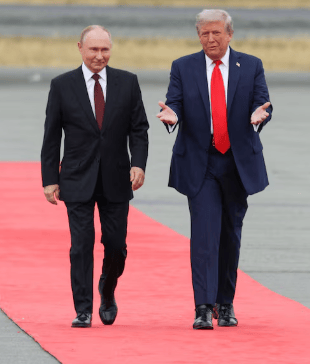A highly anticipated summit between U.S. President Donald Trump and Russian President Vladimir Putin, aimed at finding a diplomatic resolution to the ongoing war in Ukraine, has been officially put on hold. Moscow’s refusal to agree to an immediate ceasefire has cast doubt over the viability of any near-term negotiations.
Why the Trump-Putin Budapest Summit Is Stalled
The White House confirmed Tuesday that "there are no plans for President Trump to meet with President Putin in the immediate future." This announcement follows a phone discussion between U.S. Secretary of State Marco Rubio and Russian Foreign Minister Sergei Lavrov, which, despite being described as "productive," did not yield any agreement on an in-person summit.
Trump had announced last week his intention to meet Putin soon in Hungary, hoping to build on the August summit in Anchorage, Alaska, which failed to produce tangible progress toward ending Russia’s invasion of Ukraine.
However, the Kremlin has insisted that Moscow will not consider any concessions without Ukraine ceding additional territory. "Serious preparation" is required before a summit, Kremlin spokesperson Dmitry Peskov emphasized, though no exact dates have been set.
"Listen, we have an understanding of the presidents, but we cannot postpone what has not been finalized," Peskov said.
Zelenskyy Calls Out Russian Obstruction
Ukraine's President Volodymyr Zelenskyy criticized Russia’s approach, saying Moscow “is once again doing everything it can to abandon diplomacy.” He noted that the U.S. decision on providing Tomahawk missiles to Ukraine influenced Russia’s diminished interest in talks.
During a recent White House meeting, Trump described the situation as “not easy” and positioned himself as a mediator between Kyiv and Moscow. While the meeting behind closed doors was reportedly contentious, Zelenskyy highlighted a key victory: Trump publicly endorsing a ceasefire at current battle lines—a long-standing demand of Ukraine.
European Leaders Urge a Firm Stance
European allies have voiced concern over any potential Trump-Putin meeting that could occur without significant concessions from Russia. In a joint statement, leaders from Britain, France, Germany, and the EU reiterated their support for Trump’s position that fighting should stop immediately, with current frontlines serving as the basis for negotiations.
Two senior European diplomats indicated that Moscow’s rigid demands were likely the reason the preparatory meeting between Rubio and Lavrov was postponed.
“I guess the Russians wanted too much, and it became evident for the Americans that there will be no deal for Trump in Budapest,” one diplomat said.
The other added, “The Russians haven't changed their position at all, and are not agreeing to 'stop where they are.'”
Hungary as a Controversial Venue
Budapest was selected as a potential site for the Trump-Putin summit, though the choice is contentious. Hungary’s Prime Minister Viktor Orbán maintains a rare pro-Russia stance within the EU, raising eyebrows among European leaders. Additionally, logistical challenges complicate travel: Russia’s leader would need to traverse the airspace of multiple EU countries. Poland has warned it could intercept Putin’s plane due to an international warrant, while Bulgaria indicated its airspace could be used.
Hungary’s Foreign Minister Peter Szijjarto, visiting Washington, described the coming days as “serious,” hinting that discussions on the summit may continue but with no immediate breakthrough.
Trump’s Mediation Role
Trump has repeatedly highlighted his role as a mediator, saying, “Hopefully, we’ll be able to get the war over with without thinking about Tomahawks,” in reference to Ukraine’s request for long-range missile systems. The U.S. president has expressed willingness to meet Putin again following productive phone calls, but the conditions for such a summit remain uncertain.
The White House emphasized that any future meeting would depend on progress in resolving key issues, particularly Russia’s demand for territorial concessions and the U.S. stance on military support for Ukraine.
What’s Next for Ukraine Diplomacy?
While the Trump-Putin summit remains on hold, international efforts continue. Ukraine’s European allies plan to meet with Zelenskyy this week during an EU summit and a meeting of the so-called "coalition of the willing", discussing a potential international security force to guarantee a postwar settlement. Russia has rejected such a mechanism, heightening tensions further.
As the conflict persists, experts suggest that any diplomatic breakthrough will require unprecedented concessions from Moscow or a unified stance from Western allies demanding an immediate ceasefire.
Key Takeaways
Trump-Putin Budapest summit postponed due to Russia’s refusal to agree to a ceasefire in Ukraine.
Preparatory meetings between Rubio and Lavrov were also postponed, signaling diplomatic deadlock.
Zelenskyy criticized Russia’s approach and hailed Trump’s public backing of a ceasefire at current lines.
European powers urge a firm stance on negotiations, emphasizing present frontlines as the starting point.
Hungary remains a controversial venue, with airspace and political concerns complicating logistics.
Future talks hinge on Moscow’s concessions and continued U.S. and European diplomatic pressure.
You’re invited to the world’s largest email marketing conference.
Become an email marketing guru at the GURU conference. It’s two days full of all things email marketing. Learn more about newsletters, deliverability, design trends, AI, and what NOT to do with email.
What you can expect:
Keynote Speakers: Nicole Kidman, Amy Porterfield & more!
The latest digital trends in email marketing & how to increase performance.
Networking opportunities - each day!
Dj’s, dance contests (judged by Lance Bass, yes for real), breaking world records & MORE!
Spots are limited. It’s VIRTUAL. It’s FREE. It’s time to become an email marketing GURU. Join 25,000+ marketers on November 6th & 7th. Don’t miss out!
YES! I want to register! (US attendees only!)



